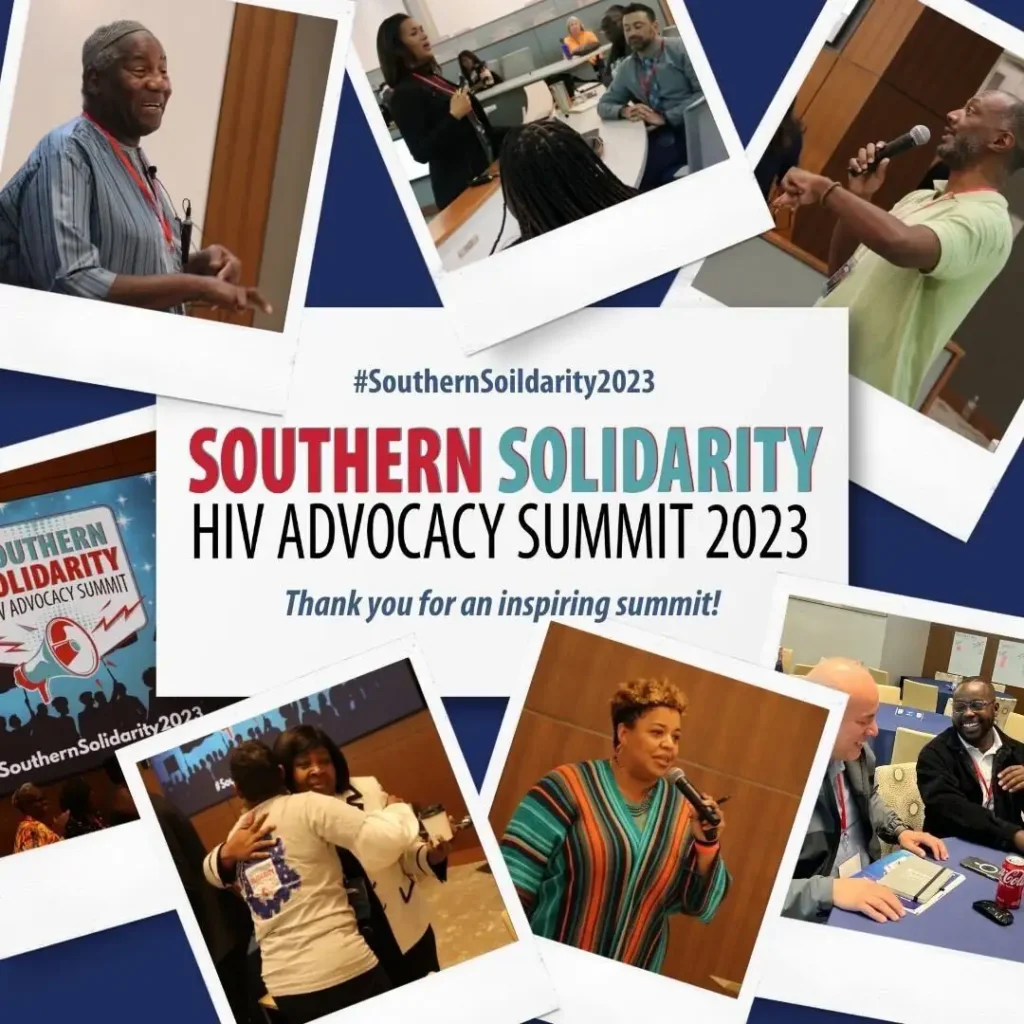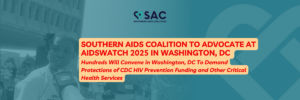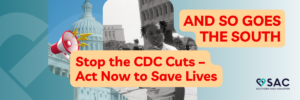We are here as advocates, supporters, allies, and conspirators all trying to find our way in addressing the needs of our communities. I want to start my remarks with a quote from Eva Marie Lewis, who started her advocacy after the murder of Trayvon Martin. Eva said, “To be an activist is to speak. To be an advocate is to listen. Society cannot move forward without both.” Reflect on those words as I go through these closing remarks.
We have come to the end of our summit. I want to thank everyone present for being a part of all these conversations, in the many ways that we can and have shown up. Throughout [this weekend’s] convening, we have learned, discussed, been inspired, and shared the challenges we face, the pathways that lay before us, and the motivation we need to succeed in our efforts. Today I am filled with a sense of hope and responsibility for progress in the South.
Our journey throughout this inaugural Southern Solidarity HIV Advocacy Summit has reaffirmed the critical importance of HIV advocacy in the South. This region, steeped in rich history and diverse cultures, has its own unique set of challenges in the fight against HIV. Earlier this week, some of us met and a question was posed by one of the leaders in this work. Mandisa Moore-O’Neal asked the room, “What does it mean to you when you hear, ‘As the south goes, so does the nation?’” That question stuck with me. The South continues to bear a significant burden of the HIV epidemic, and it’s here that our advocacy can truly make a profound impact. It is here that we find ground zero, it is here that successful efforts in advocacy can be replicated throughout the rest of the nation. Similar to how New Yorkers say, “If you can make it here, you can make it anywhere.” That is the South. That is our South.
These closing remarks are a call to action through advocacy but, our advocacy is not merely a call for policy change; it is a call for hope, for life, and for the rightful recognition of the dignity and humanity of every individual impacted by HIV. In all marginalized and sometimes vulnerable communities throughout the South, where the roots of stigma and discrimination run deep, our advocacy work is essential in fostering a more inclusive and supportive environment for individuals living with and impacted by HIV.
The South is a place of strong community ties and resilient spirit. It is this spirit that fuels our advocacy, driving forward the policies that are crucial for expanding access to prevention, care, and treatment. Our advocacy is also a bridge. A bridge, connecting those in power with the realities faced by our communities, and ensuring that the voices of people living with and impacted by HIV are heard in all the southern halls of decision-makers.
Our advocacy efforts in the South are also a beacon of solidarity, one with potential to show a strong, united front in the face of HIV. One that sends a powerful message that we stand together, bound by a common purpose to end the HIV epidemic and build a healthier, more equitable South.
Would you agree that this Southern Solidarity HIV advocacy summit has further ignited our collective resolve? Let’s continue to advocate fervently, engage with our legislators effectively, and build enduring alliances. Together, we can push the boundaries, challenge the status quo, and usher in a new era of HIV policy that truly serves the needs and rights of our communities.
The journey ahead demands our collective effort, resilience, and a relentless pursuit of justice. Our advocacy for Medicaid expansion, our struggle against stigma, and our campaign to decriminalize HIV are interconnected threads of a larger narrative. A narrative that speaks to the kind of society we aspire to build; one of equity, empathy, and justice.
As we part ways today, let’s carry with us the insights gained, the stories shared, and the resolve strengthened. The conversations we had today are but a catalyst for the actions of tomorrow. I urge each one of us to continue this crucial dialogue within our communities, with our legislators, and amongst ourselves. Together, we will advocate for a South that stands for justice, inclusivity, and health equity for all its residents, especially those living with HIV.
I started with Eva Marie Lewis and I’ll end with the brilliant, Ibram X. Kendi. He said, “Changing minds is not activism. An activist produces power and policy change, not mental change. If a person has no record of power or policy change, then that person is not an activist.”
So, let’s task ourselves today with something, let us give ourselves a goal. Let’s strive to be activist as we engage in being advocates.
Thank you for your engagement, your passion, and your dedication to forging a brighter, healthier future for the South.


